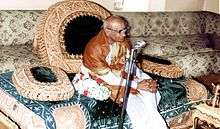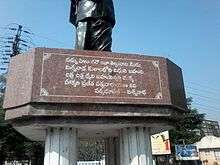Viswanatha Satyanarayana
| Viswanadha Satyanarayana | |
|---|---|
 | |
| Born |
10 September 1895 Nandamuru, Krishna District, Madras state, British India. Now Andhra pradesh, India. |
| Died |
18 October 1976 (aged 81) Guntur |
| Occupation | Poet |
| Nationality | Indian |
| Period | 1919–1976 |
| Notable awards |
Kavisamraat Kalaprapurna Padmabhushan Jnanpith Awardee Doctorate |
| Spouse | Varalakshmi |
| Children |
Sons
Daughters
Grand sons
|
| Relatives |
Parents Father-Sobhanadri Mother-Parvathi |
Viswanatha Satyanarayana (10 September 1895 – 18 October 1976) (Telugu: విశ్వనాథ సత్యనారాయణ) was born to Sobhanadri and Parvathi in the year 1895 at Vijayawada, Krishna District, Andhra Pradesh. He was a Telugu writer of the 20th century. His works included poetry, novels, drama, short stories and speeches, covering a wide range of subjects such as analysis of history, philosophy, religion, sociology, political science, linguistics, psychology and consciousness studies, epistemology, aesthetics and spiritualism.
He was a student of Chellapilla Venkata Sastry. Chellapilla was familiar to be known as Tirupati Venkata Kavulu duo, Diwakarla Tirupathi Sastry and Chellapilla Venkata Sastry. Viswanatha's style of poetry was classical in nature and his popular works include Ramayana Kalpa Vrukshamu (Ramayana the wish-granting divine tree), Kinnersani patalu (Mermaid songs) and Veyipadagalu (The Thousand Hoods).
He worked as the first principal of Karimnagar Government College (1959-61).[1]
He was awarded the Jnanpith Award[2] and Padma Bhushan in 1971.[3]
The parallel "free-verse" movement in easy prose of Telugu literature criticised him as a bigot who hung onto the strict rules of poetry such as Yati, Prasa (rhyme) and Chandas (meter). However this only covers a part of the wide variety of literature he created. At the same time, there was no contemporary in Telugu literature who could match his depth of the subjects he covered and his mastery of literature. A book with his memories compiled has been released.[4][5]
School of Thought
Viswanatha was a traditionally trained scholar in several subjects. He was a strong adherent of advaita,[6] though his learning and mastery extends to several other schools.
History
Viswanatha was of the view that history is not the story of kings but the narrative that gives one an understanding of the sociological, political, economic, cultural, scientific, spiritual and aesthetic lives of man in a given time, and their evolution.[7] Based on Kota Venkatachalam's chronology Vishwanatha wrote three series of novels depicting all these aspects of ancient and medieval society, along with stories woven around the famous characters of three royal lineages:
1. Purana Vaira granthamala is a series of 12 novels about the Magadha Royal dynasties after Mahabharata war. In this series, there are two tendencies – Krishna representing Dharma, and Jayadratha representing the darker side of human psyche, the unrighteous side. The primary characters in each of the 12 novels behave under the influence of these two tendencies, each having its temporal victories.
2. Nepala Rajavamsa caritra is a series of 6 novels about the Nepali Royal dynasties. This series expounds Carvaka school of thought, its intricacies and sub-schools, social life and values influenced by carvakas.
3. Kashmira Rajavamsa caritra is a series of 6 novels woven around the Royal dynasties that ruled Kashmir.
Literary career

Viswanatha's literary works includes 30 poems, 20 plays, 60 novels, 10 critical estimates, 200 Khand kavyas, 35 short stories, three playlets, 70 essays, 50 radio plays, 10 essays in English, 10 works is Sanskrit, three translations, 100 introductions and forewords as well as radio talks. Some of his poems and novels have been translated into English, Hindi, Tamil, Malayalam, Urdu and Sanskrit.
Veyipadagalu was later translated into Hindi by former Prime Minister PV Narasimha Rao as Sahasraphan.
Novels
Most of Viswanatha's novels depict evolving social conditions, and involve an in-depth analysis of culture as well as human nature and consciousness.
- Veyipadagalu (The Thousand Hoods)
- Swarganiki Nicchenalu (Ladders to Heaven)
- Terachi Raju (Checkmate)
- Cheliyali Katta (The Seawall)
- Maa Babu (Our babu(babu is a word that suits for son, dad and owner))
- Jebu Dongalu (Pickpockets)
- Veera Valladu (Valla the valorous)
- Vallabha Mantri (The Minister Vallabha), after Sardar Vallabhai Patel
- Vishnu Sharma English Chaduvu (Vishnu Sharma Learning English), in which Tikkana and Vishnu Sarma two great literary figures of India attempt to learn English from the author. This parody is a critique of English and its grammar.The Novel is being dramatised and Staged in Ravindra Bharati, Hyderabad.in 2006 and made as a tele film by Doordarsanin 2008 and won the Golden Nandi Award.Dr. G.B. Ramakrishna Sastry acted as Viswanadha Satyanarayana and secured the Nandi Award for Best Acting.
- Pulula Satyagraham (Tigers Satyagraha)
- Devatala Yuddhamu (The Battle of Gods)
- Punarjanma (Rebirth)
- Pariksha (Exam)
- Nandigrama Rajyam (Kingdom of Nandigam)
- Banavati
- Antaratma (The Conscient Self)
- Ganguly Prema Katha (Ganguly's Love Story)
- Aaru Nadulu (Six Rivers)
- Chandavolu Rani (The Queen of Chandavolu)
- Pralaya Naidu
- Ha Ha Hu Hu, the name of a horse-faced demigod who does a mythical landing in London
- Mroyu Tummeda (The Humming Bee), an in-depth analysis of Traditional Indian Music, sound and consciousness
- Samudrapu Dibba (Ocean Dune)
- Damayanti Swayamvaram (Swayamvara of Princess Damayanti)
- Neela Pelli (Neela's Wedding)
- Sarvari Nundi Sarvari Daka (From Night to Night)
- Kunaluni Sapamu (The curse of Kunala)
- Ekaveera (The sacred Love of two warriors)
- Dharma Chakramu (The Wheel of Righteous Order)
- Kadimi Chettu (A Tree)
- Veera Puja
- Sneha Phalamu (Fruit of Friendship)
- Baddana Senani (The General Baddana)
(The twelve below form Purana Vaira Granthamala Series)
- Bhagavantuni meeda paga (vengeance against god)
- Nastika Dhumamu (the smoke of disbelief)
- Dhumarekha (the line of smoke)
- Nando raja bhavishyati (Nanda will be the king)
- Chandraguptuni Swapnamu (Chandragupta's dream)
- Ashwamedhamu
- Nagasenudu
- Helena
- Puli Muggu (the tiger-rangoli)
- Amrutavalli
- Nivedita
(The Six below form Nepala Rajavamsa series)
- Dindu Kindi Poka Chekka (The Betel Nut Under the Pillow)
- Chitli Chitlani Gajulu (The half broken bangles)
- Saudamini
- Lalita Pattanapu Rani (Queen of the town named after Lalita)
- Dantapu Duvvena (Ivory Comb)
- Duta Meghamu (Cloud-messenger)
(The Six below form Kashmira Rajavamsa series)
- Kavalalu (Twins)
- Yasovati
- Patipettina Nanemulu (The Buried Coins)
- Sanjeevakarani (The Medicinal Herb)
- Mihirakula
- Bhramara Vasini (Goddess of the Humming Bee)
Poetry
- Srimad Ramayana Kaplavrikshamu ('Ramayana the divine wish-granting tree', the work for which he was awarded Jnanapith)
- Andhra Pourushamu (The Andhra valor)
- Andhra Prashasti (Fame of Andhras)
- Ritu samharamu (ending of the season cycle)
- Sri Kumarabhyudayamu (emergence of Kumara)
- Girikumaruni prema geetaalu (love songs of Giri Kumara)
- Gopalodaharanamu (about Gopala)
- Gopika geetalu (the gopika's songs)
- Jhansi Rani
- Pradyumnodayamu (rise of Pradyumna)
- Bhramara geetalu (songs of the humming bee)
- Maa swamy (Our Lord)
- Ruru charitramu (Story of Ruru)
- Varalakshmi trishati (300 to Varalakshmi)
- Devi trishati (in Sanskrit, 300 verses in devotion to the mother goddess)
- Vishwanatha Panchashati (500 verses to devatas)
- Vishwanatha madhyaakkaralu (series of poems written in the meter 'madhyaakkara')
- Veni bhangamu (violating the stream/plat)
- Sashi duutamu (moon-messenger)
- Sringara veedhi (the streets of romance)
- Sri Krishna Sangeetamu (Krishna music)
- Naa Ramudu (My Rama, an introductory to his concept of Rama expounded in the Kaplavrikshamu)
- Sivarpanamu (ode to Siva)
- Dharmapatni (consort)
- Bhrashta yogi (fallen yogi)
- Kedara gowla
- Goloka vasi (the lord of Goloka)
Drama/Plays
- Gupta Pasupatam (the secret Pasupata, in Sanskrit and rewritten in Telugu)
- Amrita Sarmistham (in Sanskrit)
- Anta Natakame (all is drama)
- Anarkali
- Kavyaveda Harischandra
- Talli leni pilla (motherless girl)
- Trishulamu (the trident)
- Nartanashala (the dance theater)
- Pravahamu (the flow)
- Lopala-bayata (in & out)
- Venaraju
- Ashokavanamu
- Shivaji — roshanara
- Dhanya kailasamu
- A collection of 16 short plays
Analysis
- Kavya Parimalamu (the fragrance of poetry, on aesthetics)
- Kavyanandamu (analysis of aesthetics)
- Shakuntalamu yokka abhijnanata (apprisal of Kalidasa's Abhijnana Shakuntalam)
- Allasani vari allika jigibigi (an apprisal of Peddana's poetry)
- Okadu nachana somanna (an apprisal of Nachana Somanna's poetry)
- Nannayyagari prasanna katha kalitartha yukti (an apprisal of Nannayya's poetry)
- Sitaayaascharitam mahat (great is the story of Sita)
- Kalpavriksha rahasyamulu (secrets of the Kalpavrikshamu)
- Vishwanatha sahityopanyasamulu (a collection of speeches on literature)
- Niti Gita (moral stories)
- Sahitya Surabhi (a primer on poetry and literature)
Other Writings
- Kinnerasani Patalu
- Yati geetamu
- Kokilamma Pelli
- Paamu paata
- Chinna kathalu
- What is Ramayana to me
- Atma katha
Awards
- He was titled as "Kavi Samrat"
- In 1964 Andhra Viswa Kala Parishat honored him by titling as "Kalaprapoorna".
- In 1942 on Sankranthi at Gudivada he was honored by climbing him on the elephant(gajarohana). 60 years completion celebrations(shashtipoorthi) was also held at gudivada in 1956.
- Sri Venkateswara University honored him by giving D.Lit Degree.
- In 1962 Kendra Sahitya Academy Puraskaram was given for "viswanatha madhyakkaralu".
- In 1970 he was honored as Andhra Pradesh Government's laureate.
- In 1970 Indian government awarded Padma Bhushan.
- In 1971 he was awarded with Jnanpith Award for his book "Ramayana Kalpavriksham". He was the first Telugu writer to receive Jnanpith Award. When he was awarded with Jnanapith, The below lines were written in his honors document.
- As a Poet of classic vision and virility, as a novelist and play wright of deep insight and impact, as an essayist and literary critic of force and felicity, and as a stylist of rare "range" Mr. Satyanarayana has carved for himself a place of eminence amongst the immortals of Telugu Literature. His ceaseless creativity and versatility have kept him in the forefront of contemporary Telugu Literary Scene.
References
- ↑ http://www.newindianexpress.com/states/telangana/2017/jun/13/cinare-a-pioneer-of-free-verse-in-telugu-literature-1616091--1.html
- ↑ "Jnanpith Laureates Official listings". Jnanpith Website.
- ↑ "Padma Awards" (PDF). Ministry of Home Affairs, Government of India. 2015. Retrieved July 21, 2015.
- ↑ V. Raghavendra. "Book festival: stall showcasing works of ‘Kavi Samrat’ a highlight". The Hindu.
- ↑ "'Viswanatha Satyanarayana deserved a Nobel'". TheHindu. Chennai, India. 22 July 2012. Retrieved 21 July 2012.
- ↑ Kalpavruksha Rahasyamulu
- ↑ Introduction to Purana Vaira Granthamala
External links
| Wikimedia Commons has media related to Viswanatha Satyanarayana. |